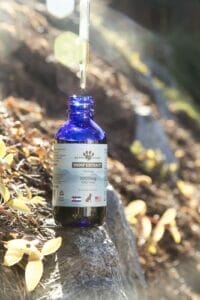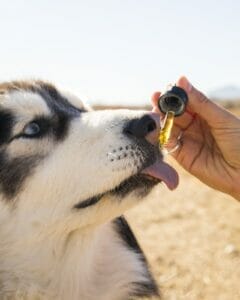Why You Should Try Coconut Oil for Your Dog’s Skin and Coat
May 13, 2023
Written By: Earth Buddy Team

As responsible dog owners, you are always on the lookout for ways to improve your dog’s health and well-being. One natural ingredient that has garnered attention in recent years is coconut oil for dogs’ coats. This versatile oil, derived from the flesh of coconuts, comes with an array of benefits. We’ll discuss each in-depth in today’s blog.
Coconut Oil for Dogs Coat Health
Coconut oil is a nutrient-dense natural product that’s well-known for its numerous health benefits stemming from its unique composition of dietary fats resulting in a beneficial supplement. Rich in medium chain triglycerides (MCTs), coconut oil from mature coconuts contains fatty acids including lauric acid, caprylic acid, and capric acid. Coconut oil is good for your dog in moderation and provides the following benefits:
- Promotes the body’s innate resistance to pathogens
- Enhances the immune system response
- Provides nutritional support for healthy immune system function
- Supports a healthy inflammatory response
- Improves your dogs’ ability to attain sleek and glossy coats
Lauric acid, in particular, is converted into monolaurin in the body, a compound that is highly effective in combating various pathogens and promoting proper inflammatory pathways.
Additionally, the MCTs in coconut oil are rapidly metabolized in the liver, providing a quick source of energy due to nutrient absorption and promoting the production of ketones, which may offer cognitive and neurological benefits.
Coconut Oil and Antioxidants
Coconut oil is also known for its antioxidant properties. Antioxidants have been shown to aid in the elimination of unstable oxygen molecules called free radicals. Antioxidant benefits also include:
- Helps eliminate free radicals associated with the aging process
- May help protect body cells and tissues
- Supports cellular health
- Supports normal bodily functions including promoting thyroid health
By incorporating edible oil into your dog’s diet or applying it topically, you can provide them with these beneficial antioxidants that support overall health and well-being.
Health Benefits for the Skin
Rich in nourishing fatty acids, coconut oil possesses natural emollient properties that can help animals achieve a soft, silky, shiny, and healthy coat. When applied topically, the oil is readily absorbed into the skin, providing deep hydration and creating a protective layer for dry and itchy skin.
Additional benefits for the skin include:
- Promotes healthy skin and good coat color
- Helps maintain normal moisture content of skin
- Support for animals with sensitive skin
- Soothes skin-related issues associated with seasonal allergies
- May help with occasional or seasonal allergies
More Benefits of Coconut Oil: Detangles Dog’s Fur
For dogs with long or curly coats, coconut oil can serve as a natural detangler, making it easier to brush through knots and tangles. Gently massaging the oil into your dog’s coat can help to loosen stubborn knots and prevent matting, resulting in a smoother, more manageable coat.
Some dogs lick the coconut oil off their fur. If this is the case, don’t worry. It’s an edible oil.
How to Use Coconut Oil for Your Dog’s Coat
When selecting coconut oil for your dog, it’s essential to choose a high-quality, unrefined, virgin coconut oil to ensure it contains all the beneficial nutrients. To use coconut oil for your dog’s coat:
- Start with a small amount of oil, approximately a teaspoon or less, depending on your dog’s size.
- Warm the oil between your hands to liquefy it.
- Gently massage the coconut oil good into your dog’s coat.
- Gently pat dry or irritated areas.
- Allow the oil to absorb into your dog’s skin for several minutes before brushing or combing their coat to distribute the oil evenly. This will reduce doggy odor.
- Repeat the process as needed, adjusting the amount of oil placed on your dog’s skin based on your dog’s needs and preferences.
Why Not Fish Oil
You may be asking yourself, “Why is coconut oil being added to your dog’s diet instead of fish oil?” There’s a common misconception that fish oil, like salmon oil, should be used in supplements rather than coconut oil. However, it’s important to understand why a supplement containing fish oil could be damaging.
Fish oil, a popular supplement known for its high omega-3 fatty acid content, has a tendency to become rancid quickly if not stored and handled properly. Oxidation is the primary cause of fish oil turning rancid, which occurs when the oil is exposed to air, light, or heat. Rancid fish oil not only loses its beneficial properties but can also produce harmful substances called peroxides, which can cause harm to your pet if consumed.
The likelihood of the fish oil becoming rancid before even being placed on the shelf or ordered is high. This means many products with fish oil could lose their beneficial properties before they make it to your dog’s mouth.
Feeding Your Dog Coconut Oil
Adding coconut oil to your dog’s diet should be done with care and consideration. Before making any changes to your pet’s diet, consult with your veterinarian to ensure coconut oil is appropriate and safe for your dog. If given the green light, start by adding a small amount of coconut oil to your dog’s food.
How Much Coconut Oil?
It’s important to know how much coconut oil your dog should consume. You don’t want them consuming too much coconut oil, especially since it contains saturated fat. Although it’s generally safe, you may notice some loose stools when your dog is fed coconut oil.
As a general guideline, add about 1/4 teaspoon for small dogs and 1/2 teaspoon for big dogs to your dog’s food. Gradually increase the dosage over a week or two, monitoring your dog’s reaction to the new addition. The general guideline for daily coconut oil intake is roughly 1 teaspoon per 10 pounds of body weight. However, your veterinarian may recommend a different dosage based on your dog’s specific needs, taking into account your dog’s body weight, dry skin, itchy skin, or otherwise.
You can even add coconut oil to your dog treats. Dog treats are an excellent way to incorporate this beneficial supplement. Flaxseed oil possesses many of the same benefits and can also be incorporated into your dog’s treats this way.
Remember to account for the extra calories from coconut oil in your dog’s overall daily caloric intake to prevent weight gain and maintain a balanced diet. If you have an obese or overweight dog, it may be best to wait until you get their weight under control before adding this saturated fat to their diet to prevent additional weight gain.
How to Choose High-Quality Coconut Oil for Dogs
When choosing high-quality coconut oil for your dog, it’s essential to consider several factors that can influence the oil’s purity, nutritional value, and overall effectiveness. Here are some tips to help you make an informed decision:
- Virgin or Extra Virgin: Opt for virgin or extra-virgin coconut oil, as these types are less processed and retain more of their beneficial properties compared to refined coconut oil. Cold-pressed coconut oil or expeller-pressed coconut oil preserves the oil’s natural nutrients.
- Organic: Look for coconut oil that is certified organic, meaning it has been produced without the use of harmful chemicals, pesticides, or artificial fertilizers. Organic coconut oil ensures a cleaner and healthier product for your dog.
- Unrefined: Choose unrefined coconut oil, as it undergoes minimal processing and retains the natural aroma and flavor of the coconut. Unrefined coconut oil is considered to be more nutrient-dense compared to refined varieties.
- Non-Hydrogenated: Avoid hydrogenated or partially hydrogenated coconut oil, as these types contain harmful trans fats created during the hydrogenation process. Trans fats can be detrimental to your dog’s health.
- Non-GMO: Select coconut oil that is labeled as non-GMO, ensuring that it is free of genetically modified organisms and is sourced from coconuts that have not been genetically modified.
- Packaging: Purchase coconut oil in a glass jar rather than plastic, as glass is a more stable and eco-friendly packaging material. Glass also prevents the leaching of chemicals from plastic containers, especially when exposed to heat.
- Transparency: Look for brands that provide clear information about their sourcing, manufacturing processes, and quality standards. This transparency can indicate a commitment to producing a high-quality product.
By considering these factors when offering your dogs coconut oil, you can ensure that you are providing them with a safe, high-quality, and beneficial supplement to support their overall health and well-being.
The Benefits of Coconut Oil for Dogs
All of Earth Buddy’s full spectrum hemp extract products are blended into organic medium chain triglycerides, also known as medium chain fatty acids, from coconuts due to their wide array of benefits. Earth Buddy sources organic coconut oil for maximum benefit. The company is also fully transparent and committed to answering any questions for the maximum benefit of the customer. In a world with so many products making false claims, Earth Buddy prides itself on honesty and high-quality products.
For further reading, we recommend:
You Might Also Enjoy
Like us, our dogs, and other mammalian species, cats have an endocannabinoid system. This system…
Learning how to calm a dog down is an essential skill to have in your…
Whole foods are integral to a dog’s diet, offering unprocessed, natural nutrients that promote and…





